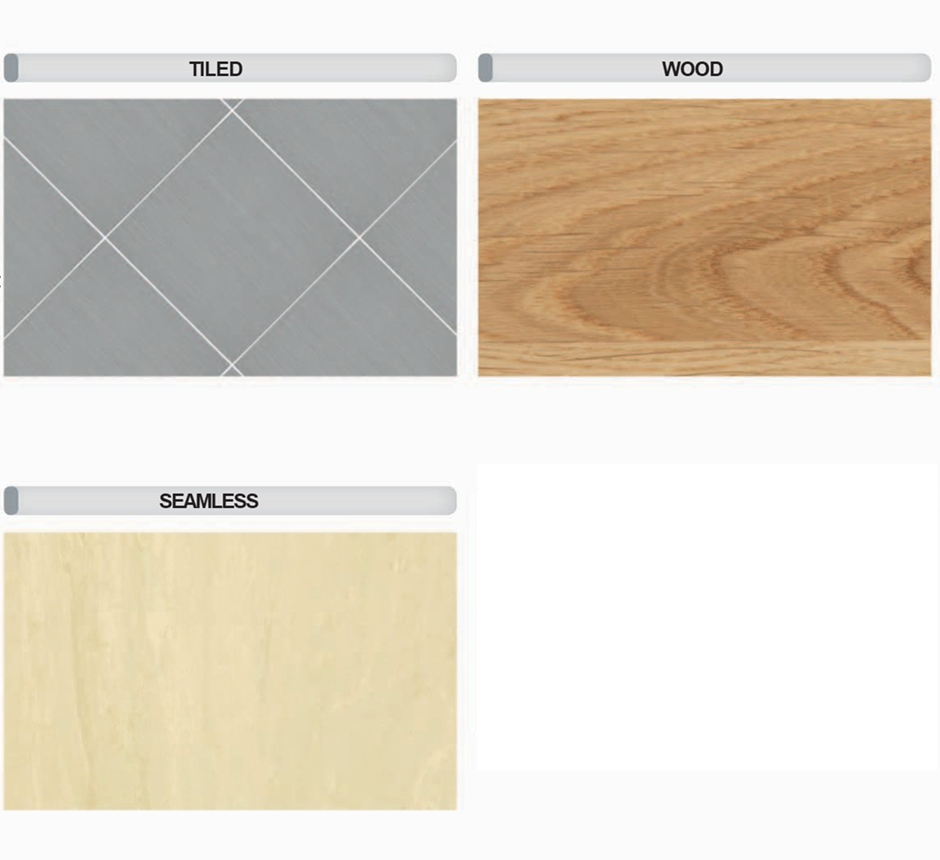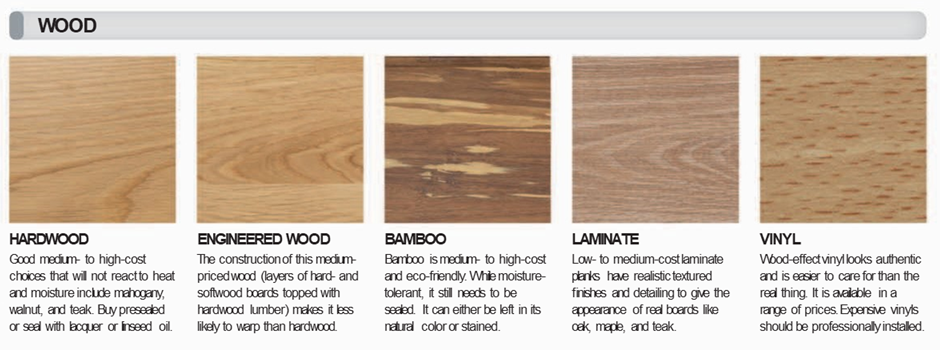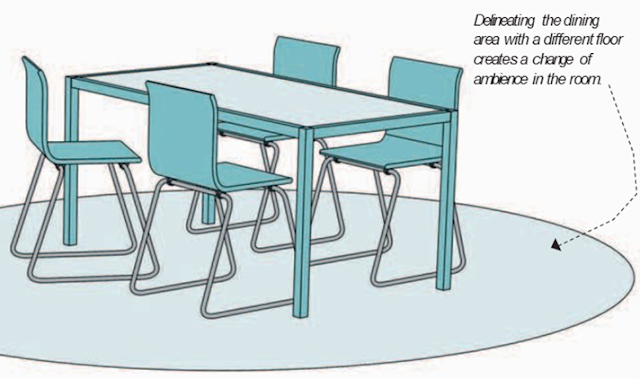Guide to Choose the Best Flooring for Kitchens | Types of Kitchen Floor | Kitchen flooring
The floor in your kitchen is
likely to suffer from more wear and tear than flooring in any other room in your
home, so choose something that can deal with all your requirements. In addition
to choosing something that looks good,
you also need to consider how much maintenance it will require.
CHOOSE
THE LOOK
Flooring that’s suitable for a kitchen broadly falls into
three types: tiled, wood, and seamless. Tiled and poured floors create a contemporary look and can withstand the most
wear; wood and tiles are good choices if you want an informal, rustic look.
TILED
A tiled floor is a classic
choice for a kitchen. When choosing tiles, consider the size and finish: large tiles make a space look contemporary, while smaller tiles give a room
a more traditional feel. The more
grouting there is, the more cleaning the floor will require.
WOOD
Wood floors should be well sealed, and must be able to withstand both the foot traffic of a busy
space and the raised moisture levels of
a cooking area. Planks can appear visually longer and wider, so are a good choice for small and
narrow kitchens.
SEAMLESS
Seamless designs, which include sheet vinyl, rubber, and
linoleum, and poured floors like concrete
and resin are essentially one piece of flooring without any seams. The latest sheet flooring designs are upmarket and good for small
areas.
CHECKLIST
When calculating the number of tiles, hardwood,
or laminate flooring you need for your
project, add at least 10 per cent extra to the total amount as a contingency.
If you are laying tiles, particularly large
tiles, your subfloor must be perfectly
level. If you have floorboards, you will need to cover them first with marine plywood.
If you have a sound, flat concrete floor or an
existing flat tiled floor, you can lay
new tiles right on top, but check first that the raised level of the new floor will not obstruct any doors or other moveable items in the room.
CHOOSE
THE MATERIAL
The material you choose will
largely depend on your budget and whether you prefer the look and solidity of
tiles or a warmer, softer feel like
vinyl or rubber. If installing underfloor heating, check which materials
are suitable to use with it first.
TILES
PORCELAIN
Hard-wearing porcelain is a versatile choice available at a variety of prices, designs,
and glazed and unglazed finishes. Seal
unglazed tiles before and after
grouting.
CERAMIC
Ceramic tiles are good for large areas. Available in a variety of colours, shapes,
and textures, they are cheap,
hard-wearing, stain-resistant, and don’t
need sealing.
QUARTZ COMPOSITE
If you want a coordinated look for your countertops and floor, this may be a good choice. It doesn’t stain, hide dirt,
and rarely chips or cracks, but it is
expensive.
TERRAZZO
This expensive flooring is made of marble chips set into the cement with a colour
pigment added. Endless combinations of
colours and finishes can be achieved.
CONCRETE
Extremely hard-wearing but costly, concrete tiles are available in various
sizes with a polished or matte finish.
The polished effect is easier to clean,
so it suits a kitchen.
TERRA-COTTA
Medium-priced terra-cotta is very porous so the tiles must be sealed to prevent
staining. Choose from a range of shapes
such as classic square or brick-shaped
tiles.
TRAVERTINE
Though expensive, this natural stone floor is available in either a sleek, polished
finish or a rustic, tumbled look with
soft edges and a spongelike appearance.
LIMESTONE
These expensive tiles range from chalky white to honey in colour and often
reveal details of fossils within. Choose
polished gloss tiles or rougher, matte
finishes.
SLATE
The uneven “chipped” surface of black or grey slate sometimes has flecks of gold or orange, and always creates a dramatic look. It is medium to high in price.
LAMINATE
These laminated decorative fiberboard tiles are available in a range of colours and designs, including slate and travertine,
and are a low- or medium-cost option.
VINYL
Vinyl gives an authentic look to the material it mimics. Prices depend on the brand.
Cheaper versions have a self-adhesive backing, so are easy to stick to the floor.
RUBBER
Medium-priced rubber comes in a range of colours and textures. Smoother
surfaces are easy to clean; low-profile
textures, like studs, provide extra grip
underfoot.
WOOD
HARDWOOD
Good medium- to high-cost choices that will not react to heat and moisture include mahogany,
walnut, and teak. Buy pre-sealed or seal with lacquer or linseed oil.
ENGINEERED WOOD
The construction of this medium-priced wood (layers of hard- and softwood boards topped with hardwood lumber) makes it less likely to warp than hardwood.
BAMBOO
Bamboo is medium- to high-cost and eco-friendly. While moisture-tolerant, it still needs to be sealed. It can either be left in its natural colour or stained.
LAMINATE
Low- to medium-cost laminate planks have realistically textured finishes and detailing to give the appearance of real boards like oak, maple, and teak.
VINYL
Wood-effect vinyl looks authentic and is easier to care for than the real thing. It is available at a range of prices. Expensive vinyl should be professionally installed.
SEAMLESS
CONCRETE
A poured concrete floor is installed whole, then polished
into a perfectly smooth surface. It is
an expensive option, but comes in a range of colours and is durable.
RESIN
An expensive poured resin flooring offers a seamless finish.
Highly contemporary, it’s available in both matte and gloss finishes and a range
of colours.
RUBBER
Practical, hardwearing, and warm underfoot, medium-cost rubber comes in a huge range of colours and textures—the smoother surfaces are easier to keep clean.
VINYL
Modern sheet vinyl is cheap or mid-priced and is available in a huge range of designs that reproduce the look
and texture of many different floor
surfaces.
LINOLEUM
Medium-priced linoleum is made of natural, sustainable ingredients. It is easy to clean and scratches or dents only if heavy objects are dropped on or dragged across it.
ZONING
YOUR KITCHEN FLOOR
If you have a large open-plan
kitchen with dining space, dividing the
dining and cooking floor areas into separate zones will make your scheme look more successful.
1. Choose a rug in colours that
match the palette of your kitchen and place it beneath the table and chairs. Make
sure that you buy a rug large enough so all the chair legs can stand on it comfortably, even when they are pulled out.
2. Stay away from
light-coloured flooring or a rug with a
deep pile or weave that will retain dropped
food, and choose a material that’s easy
to clean.












No comments:
Post a Comment